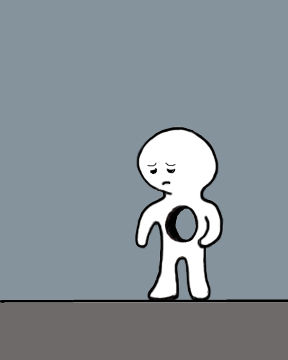Freudian Psychology
Existence is Suffering
Perhaps, beneath everything, there is inescapable pain.
Posted September 18, 2016 Reviewed by Jessica Schrader

"Existence is suffering" is the common translation of the First Noble Truth of Buddhism. As an avid reader of Zen Buddhism, I’ve often argued that this Noble Truth isn’t true at all, or that it is simply a precursor to the other Noble Truths which teach one how to alleviate suffering. But recently I’ve changed my stance.
As a therapist, I am privy to the pain of many people. Many promising students have told me they won’t become therapists because they don’t feel they can handle listening to others’ pain. No one is in therapy because his life is amazing and he’s pain-free. So it is expected that a therapist hears, and sometimes dwells, in others' suffering.
What may be surprising, however, is how much pain people that aren’t my clients are in. Perhaps because I am a therapist, friends, colleagues, and students share their pain with me. Interestingly, their pain is often no less intense than those seeking relief in my therapy office; they struggle with it just as much. The point is the vast majority of the population is dealing with something painful.
Many religions expect people to accept life as hard and painful, and there will be rewards in the afterlife. People are expected to deal with the harshness of life, be good, and wait for their rewards. This is further evidence of the pain inherent in life.
Though much of Buddhism doesn’t claim an afterlife, the typical translation of the First Noble Truth denotes that even in pleasure there is suffering, because we know pleasure ends (Warner, pg. 22). Jason Silva, in his video, “Existential Bummer,” purports that even in the throes of love, there is pain in the knowledge the moment will pass.
Freud famously said, “The best we could hope for would be insights that left us feeling common, ordinary, everyday unhappiness.” (Green & Piel). Freud isn’t the only one with a pessimistic view. Many believe that grappling with the existential issues inherent in life (that you’ll die, personal responsibility, isolation, freedom, purpose, meaninglessness) lends itself to sadness. When I lecture about existential issues, many students challenge that it is a depressing philosophy, and they’d rather not consider it. An argument can be made that underneath everything (as Louie CK so eloquently puts in this video) there is an emptiness and isolation that cannot be denied. The awareness of this can be painful. In fact, many simply accept that life is hard (and “hard” could be argued to be synonymous with painful).
Hopefully, the argument has been sufficiently made that there is a great deal of pain in life. I would like to take a liberty and assume Louis CK, and existentialists, are correct in believing that underneath everything there is emptiness, and this equates with pain. Brad Warner says about Buddhism and the void everyone feels and seeks to fill: “the lack of fulfillment we feel is natural and normal. That’s true enlightenment. It’s when we feel fulfilled that we are deluded” (pg. 87). Most of what we are doing is distracting ourselves. We distract ourselves from the emptiness and meaningless of it all by working, creating a purpose, believing religious tenets, buying things, addictions, compulsions, and just about any activity we get ourselves involved in. Some argue that the majority of what we do is compulsive behavior to ignore the fact we are dying and alone. This isn’t even accounting for the way people attempt to avoid the situational pain they are experiencing.
By now you might be wondering why I am trying to depress you with all of this existential angst. Actually, I am not. I am trying to get you in touch with what is already there, but for beneficial reasons. The first is to help those who are interested to engage in things they enjoy, rather than what they compulsively gravitate toward to alleviate some of their suffering. For example, instead of mindlessly watching television, mindfully enjoy your cup of coffee, or tea, or craft beer, or whatever lights up your taste buds. Or perhaps instead of engaging in the compulsive behavior you later regret, really converse with someone you care about. In other words, mindfully engage in your life, and in the distractions that make life enjoyable.
A second reason I raise this issue is to demonstrate those that suffer are not alone. So many of my clients believe they are one of few who experience the thoughts they do, the feelings they do, or the pain inherent in life. They believe they have to put on a show to be perceived as normal. What they don’t know is that it is normal to put on a show (normal does not equal healthy), and most of the people they view as “normal” are doing the same.
A third reason I was inspired to write this is so that everyone takes a little more care with those they come in contact with. As I wrote in “A verbose argument for silence,” we often aren’t aware of how what we do and say is affecting another. People are in a hurry to get through the daily activities of life, and the pain others may be in is not considered. Everyone would benefit from showing a little more love and compassion and being cognizant of their pain, and thereby the pain of others. As Ram Dass said, “We’re all just walking each other home”.
Copyright William Berry, 2016.
References
CK., Louis; 2013; Appearance on Conan; Retrieved from: hhttps://www.youtube.com/watch?v=5HbYScltf1c on September 17th, 2016.
Green, M.G; Piel, J.A; 2010; Theories of Human Development: A Comparative Approach; 2E; Routledge Publishing, New York, N.Y.; Page 43.
Silva, J; 2013; Existential Bummer; Shots of Awe; Retrieved from: https://www.youtube.com/watch?v=Yb-OYmHVchQ on September 17th, 2016.
Warner, B; 2010; Sex, Sin, and Zen; New World Library, Novato, CA.




